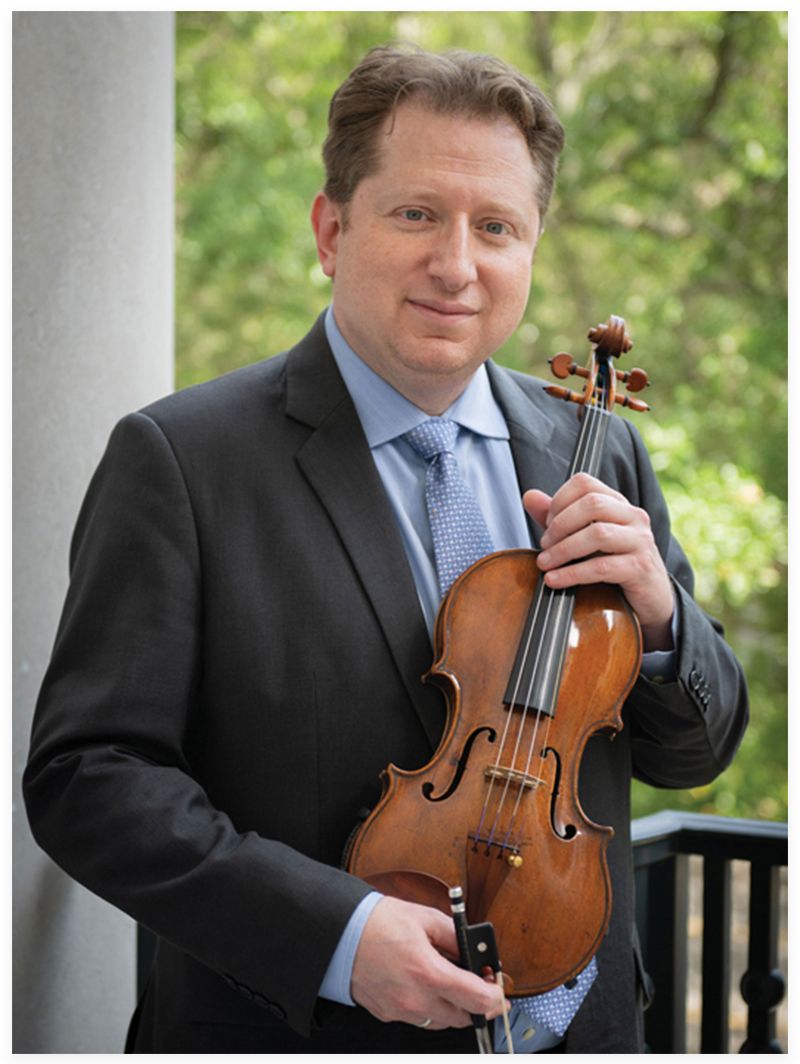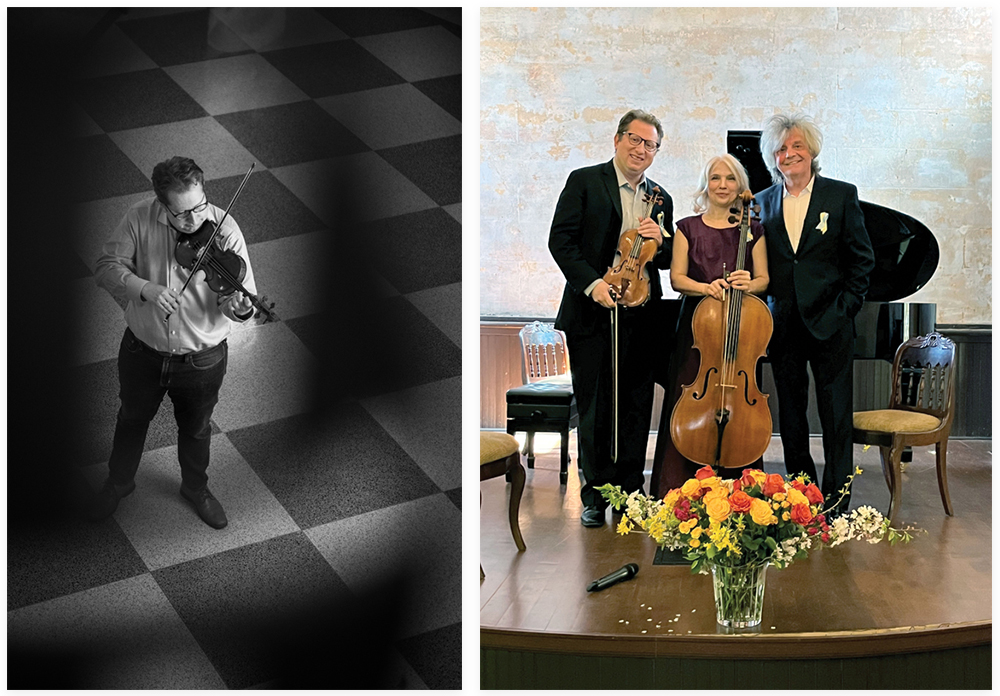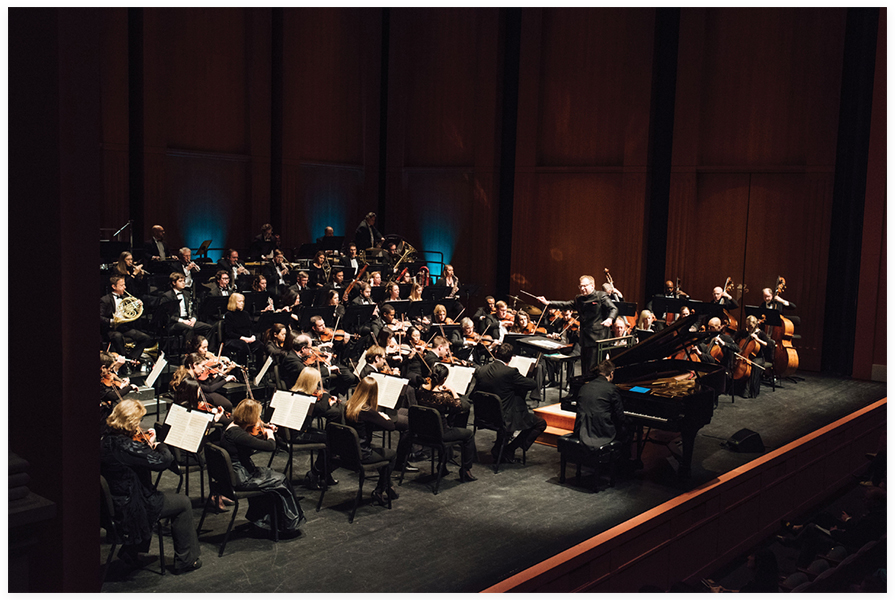Meet the beloved violinist and hear him play a priceless 17th-century instrument

The 1638 ‘ex-Degen’ Andrea Guarneri violin has felt the caress of numerous practiced hands over the centuries, producing the notes of many a virtuoso, including Swiss violinist Franz Degen. Yet if this celebrated instrument could speak, it might reserve the highest regard for its current maestro and caretaker, Yuriy Bekker, a musician who blends world-class artistry with an uncommon humility.
Concertmaster, artistic director, and principal pops conductor of the Charleston Symphony Orchestra (CSO), Bekker is also a global ambassador for the Holy City. Colleagues, friends, and concertgoers regard him among the most important and respected figures of the local arts community. “I am so grateful for everything life has given me. It’s been extraordinary,” says Bekker, an ebullient 42. “My personality I owe to my mother, Selima, who died when I was 15. She was an educator, a teacher of Russian languages, and a very warm and kind person.
“She taught me many things. One of them is that when people open up to you, you have to embrace it and be open in return,” he continues. “People loved her and wanted to be around her. Today, when I think of my career, everything I do is in her memory and in her honor.”
A Difficult Passage
Born in Minsk, Belarus, in 1981, Bekker immigrated to the US with his family a decade later. Sponsored by his Ukrainian grandfather, who had come to America in the ’70s, they put down roots in New York City. He found them an apartment in the Flatbush section of Brooklyn, and several Jewish organizations helped them get settled. “I do not have fond memories of Belarus. I experienced a lot of anti-Semitism as a child there and did not understand why we were subjected to such constant discrimination and name-calling,” Bekker recalls. “Belarus was a communist country, and my parents were scared about leaving. I was excited to be coming to America but was told not to mention our departure to anyone. We had heard of many Jewish families being robbed at train stations on their way out.”
The family arrived in the US as refugees, having sold everything they possessed for a sum equaling $70. Bekker’s father, Valentin, had been an electrician in the Soviet Union. Both parents sacrificed their careers for Bekker and his older brother, Dmitry, who still lives in Brooklyn. “Dad was in his late 40s. He did not have a good grasp of the language, and it was very hard for him,” notes Bekker. “He settled for a job at a private school as a security guard and later worked in maintenance. We were on welfare.”
Selima found work cleaning houses and caring for the elderly to pay for her son’s violin lessons. But it was a measure of her character and drive that in four years she earned three degrees, became certified to teach, switched careers from languages to special education, and got a job in the public school system. “She was very creative and exerted a significant influence,” says Bekker.

Yuriy Bekker as concertmaster for the Charleston Symphony Orchestra, playing side-by-side with the youth orchestra.
Life on a String
As a six-year-old in Belarus, Bekker first gravitated toward the piano, but the class was full. “The audition proctor asked if I would be interested in playing the violin instead. I accepted, and it was the right decision. It truly clicked with me,” he recalls.
The aspiring musician continued his studies in the States. By his teens, after Selima died, he was getting paying gigs. “I started making money as a freelancer in New York and doing pretty well for a teenager,” he says. In 1999, Bekker enrolled at Indiana University. “Moving to Indiana was a tremendous cultural shock, and I also had a very demanding violin teacher [Nelli Shkolnikova], who had defected from Russia years earlier,” he says.
Although Bekker had caught the conductor bug at a music camp when he was 15, he was determined to focus on the violin through high school and college. “It is hard to do both things well. I did apply for a master’s in conducting at Indiana and was accepted. But I turned it down because I realized that at age 22 I was closer to getting a job as a violinist,” he explains. “Much later, in Charleston, after [CSO music director] David Stahl’s death, I found myself doing both things without really seeking it. I never expected it, but I love both art forms, and both are very important to me now.”
After earning his bachelor’s degree in 2003 and a master’s in music in 2004, both from Indiana University’s Jacobs School of Music, Bekker enrolled in the prestigious Peabody Institute at Johns Hopkins University in Baltimore, completing requirements for a graduate performer’s diploma in 2006 under the tutelage of Herbert Greenberg. “Mr. G. had a profound influence on me. He set a great example of mentorship. He cares so much about all of his students and is so generous with his time. He refined my technique and helped me bring out more musicality and style. He truly inspires me.”
Upon graduation, Bekker began looking for work in earnest. He auditioned widely, ultimately landing a job with the Houston Grand Opera and Houston Ballet Orchestra, but moved on to the Houston Symphony for a one-year contract.
Then fate took a hand. “In 2006, I got a phone call from Mr. Greenberg about a concertmaster job opening in Charleston,” he explains. Bekker credits Stahl, who had been a colleague of Greenberg in the late 1970s, with bringing him here. It was no small gesture. Stahl, a student of Leonard Bernstein, was a renowned American conductor, who served as the music director of the Staatstheater am Gärtnerplatz in Munich, and was highly influential as the music director of the CSO from 1984 until his death in 2010.
Bekker originally visited Charleston in 2001 to perform with the Spoleto Festival Orchestra, and Stahl eyed him for the CSO. “I was one of two finalists in the end, and David picked me,” says Bekker, who played a pivotal role in the CSO’s recovery from the dual blows of Stahl’s death and the Great Recession. “I feel I have grown more in Charleston, on this job, than through any of my schooling. Of course, my teachers were incredible, and I would not be here if not for them. I still follow their advice, but I’ve grown so much by being concertmaster, by conducting, by playing.”
International Renown, Local Focus
Bekker’s credits are legion. In addition to the CSO and his appearances at Spoleto Festival USA and Piccolo Spoleto, he has also held the position of concertmaster for the Orlando Philharmonic Orchestra and the AIMS Festival in Graz, Austria. As a performer, he has played with the Vancouver Symphony, Ireland’s Ulster Orchestra, the Buffalo Philharmonic, and Chicago Chamber Music Society, as well as premier music festivals around the globe.
As his crowded schedule permits, Bekker travels as a guest conductor and violinist. Summers find him on the faculty of the Gingold Chamber Music Festival in Miami and Nelli Shkolnikova Academy in France. Locally, in addition to his responsibilities with the CSO, Bekker serves as an adjunct violin professor and conductor of the College of Charleston Orchestra. “It has been a great joy working with our students. They are so passionate about the music, have a great work ethic, and have so much energy,” he says. “Every year, the orchestra grows, improves, and reaches new levels. This past season was an amazing and memorable year, especially with our performance at the Kennedy Center.”
Today, Bekker splits his time between the CSO, the college, and his family, who live on John’s Island. His wife, Jenny, is a part-time clinical pharmacist at the Ralph H. Johnson VA Medical Center, and their Charleston-born children, Nathanael, age six, and Charlotte, four, are already showing musical aptitude. Nathanael has started violin lessons, and Charlotte aspires to play flute one day, “just like her mom,” notes Bekker. Family life and serving in three capacities with the CSO is very much a balancing act. He seems constantly at work and is energized by it. “I do work all the time, but I feel very fortunate because I absolutely love what I do,” he says.
And that work is held in the highest esteem by colleagues, audiences, and friends. “Yuriy is a gem in our city’s artistic crown. Very few people have had such a positive impact on Charleston’s music scene. On top of all of this, he is one of the kindest, most generous people I have ever known,” says composer Edward Hart, dean of the School of the Arts at the College of Charleston. Hart and Bekker collaborated on Under an Indigo Sky, a CD featuring Hart’s music that hit number two on the Billboard classical chart this spring.
Building Dynamics
“The role of an orchestra in the 21st century isn’t just playing,” wrote acclaimed American conductor and composer Leonard Slatkin, “it’s about developing future audiences and performers.” As the Charleston Symphony Orchestra approaches its 90th birthday in 2026, this role is integral. While music director Ken Lam moved on last year, CSO executive director Michael Smith remains, and the orchestra has added five musicians to its roster, now numbering 24. “I think this number works for our community and for what Charleston can afford,” says Bekker, who will conduct a Masterworks performance of Verdi’s Requiem next spring, adding another milestone in his career. “The CSO is a cornerstone of the arts in our state, but we are no longer a small regional orchestra. We aspire to be an orchestra that continues to have a major impact in our community and that is also admired by orchestras across the US.”
The CSO is in the public phase of a fundraising campaign, having raised more than $15 million for its new endowment in less than a year. “Some of the nation’s best orchestras, as in New York and Cleveland, have enormous endowments to fund operations,” Bekker notes. “Our goal was $9 million. But our hope was always to exceed the original goal. An orchestra of our size should have an endowment of $20 million. We expect to get there eventually.”
For him, the question of what makes for a genuinely great orchestra is a matter of fundamentals, and not only that of musicianship. It also requires a fully engaged board, exceptional administration, and audiences who expect performances of a high caliber. “Greatness is achieved by orchestra musicians who are able to play chamber music on a large scale,” he says. “Musicians must listen attentively and react to each other constantly, anticipating where the music will go. We don’t talk when we play our instruments, but we do communicate nonverbally all the time.”
The CSO’s new season opens September 22, and Bekker describes the repertoire as a “who’s who in classical music.” With the orchestra’s latest additions, one wonders how symphonies in comparatively small markets like Charleston not only manage to earn the kind of respect accorded major metropolitan orchestras, but to compete for top talent.
There are several factors, not least the CSO’s reputation, and the ways in which the media have glamorized Charleston as a travel, culinary, and arts destination. “Charleston being what it is, we attract many qualified musicians to come and play with us, and this is vitally important,” says Bekker. “The way the market is today there are not many jobs in orchestras. We don’t only want great musicians, but great colleagues. The atmosphere in our organization is very collegial and positive and uplifting, and this is not seen in many orchestras.
“Also, it’s the mentality of our orchestra. We want to get better. We are constantly thinking about what could be improved,” he continues. “What I see for this year, what’s very transformative, is having renowned guest conductors who will push us to new heights.”
Connections Utilized
Bekker, whose off-hours’ listening extends to bluegrass, French and Brazilian jazz, and The Beatles, also employs his extensive friendships and professional connections to attract guest performers to the city, and says the CSO’s reputation for playing “way beyond our budget” has considerable allure. “The word is getting out to a broader population of artists in the world. Famous artists want to come here. I think our orchestra has never enjoyed the star power we have now, which is one way we are breaking new ground,” he explains. “We are also championing composers who are underrepresented. When we are programming, we want to serve everyone in our community. The symphony is for everybody. We want everyone to relate and connect to the CSO.
“We’re now in a building phase, and we’re here to stay.”

(Left) Playing the “ex-Degen” Andrea Guarneri in the Gaillard Center lobby; “Early on, while playing the violin as concertmaster... it felt like a Ferrari,” wrote Bekker about the instrument in The Strad magazine. “Having played this instrument for nearly four years now, I feel very fortunate... this has enabled me to become a better player. I never expected this level of growth in my early 40s, and it is a great blessing.”; (Right) Bekker with friends and College of Charleston colleagues Natalia Khoma and Volodymyr Vynnytsky wearing Ukrainian flag pins in support of Ukraine at a March 2022 performance in Lancaster, South Carolina.
Yuriy Bekker: Career At A Glance

Top Pops: Bekker has served as the CSO’s principal pops conductor since 2016, delighting audiences with a repertoire of classics and popular tunes. (Above) At the CSO League 2018 Concert Gala performing the music of Bernstein and Gershwin with Grammy-nominated pianist Paul Sánchez
Charleston Symphony Orchestra 2023-24 Season
The Gaillard Center’s Martha and John M. Rivers Performance Hall will resound this season with the CSO’s customary array of Masterworks series offerings and pops concerts, along with a few surprises
Masterworks: “Every program we have has familiar blockbuster pieces that everyone knows and loves,” says Bekker. Opening weekend (September 22) brings Edward Elgar’s 14 short “Enigma” Variations, Maurice Ravel’s Le Tombeau de Couperin, and Florence Price’s Piano Concerto in One Movement.
Guest conductors: Thomas Wilkins, Pinchas Zukerman, Carl St. Clair, Gerard Schwarz, William Eddins, Tito Muñoz, and Lina González-Granados
Season highlights: Dvořák’s Symphony No. 7, Tchaikovsky Symphony No. 5, Verdi’s “Messa da requiem,” Morten Lauridsen’s “Lux Aeterna,” Jessie Montgomery’s “Starburst,” and Winton Marsalis’s Concerto in D for Violin and Orchestra
Pops Series : This season trains its spotlight on movie music (it’s anybody’s guess the film character in whose guise the impish Bekker might appear), the Harlem Renaissance, the holiday season, and “Cirque de la Symphonie.”
For more, visit charlestonsymphony.org.
WATCH: Concertmaster And Artistic Director Yuriy Bekker